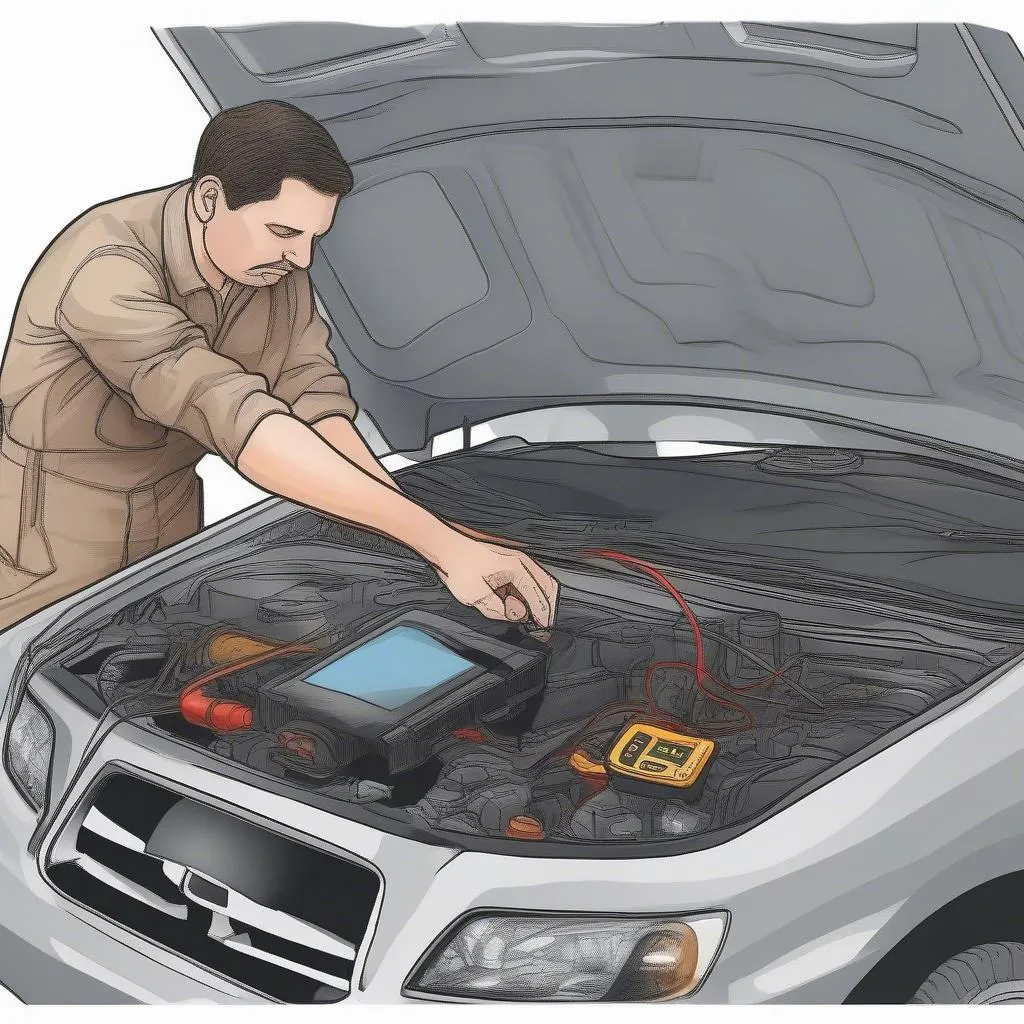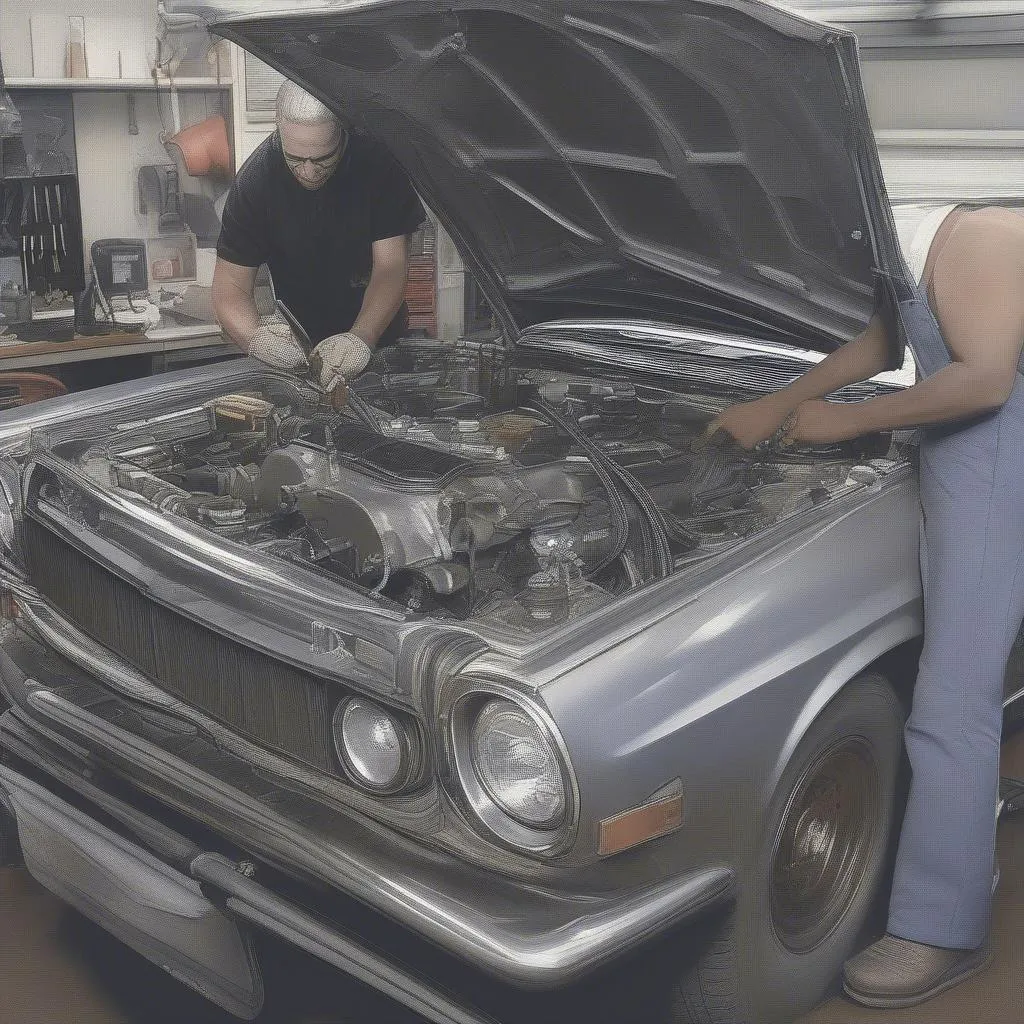Imagine this: you’re driving down the Pacific Coast Highway in your classic Ford Mustang, the California sun warming your face. Suddenly, your engine coughs, splutters, and your “Check Engine” light throws a fit brighter than the Las Vegas Strip. What do you do? Well, you could pull over and try to decipher the engine’s cryptic messages like a modern-day oracle. Or, you could use a diagnostic scanner, your key to understanding your car’s internal dialogue. But what does a diagnostic scanner connect to, you ask? Buckle up, because we’re about to embark on a journey to decode this mystery.
Unveiling the Mystery: What Does a Diagnostic Scanner Connect To?
The answer to this question, like many things in the automotive world, isn’t a simple one-word answer. “What does a diagnostic scanner connect to” can be viewed from different perspectives:
- The Mechanic’s Perspective: For seasoned mechanics like John Smith from Atlanta, a diagnostic scanner is an extension of their senses. It’s how they communicate with the car, diagnosing issues that would otherwise remain hidden.
- The Technical Perspective: In technical terms, a diagnostic scanner, often using the OBD-II protocol (On-Board Diagnostics), connects to your car’s Electronic Control Unit (ECU) – the brain of your vehicle.
- The Economic Perspective: Think of a diagnostic scanner as an investment. By quickly pinpointing problems, it can save you time and money on unnecessary repairs, making those unexpected trips to the mechanic a little less painful.
The Electronic Control Unit (ECU): Your Car’s Command Center
Let’s delve a little deeper. The ECU is a marvel of modern engineering, constantly monitoring and adjusting various systems within your car. This includes:
- Engine Management: Fuel injection, ignition timing, emissions control – the ECU orchestrates it all.
- Transmission Control: Shifting gears seamlessly? Thank your ECU for that smooth ride.
- Braking System: Anti-lock braking systems (ABS), traction control – all overseen by the ECU.
Imagine the ECU as a bustling control room, with sensors throughout the vehicle acting as its eyes and ears. The diagnostic scanner acts as a direct line to this control room, allowing you or your mechanic to access a treasure trove of information about your car’s health.
How Does a Diagnostic Scanner Work?
Remember those cryptic messages we talked about? The ECU speaks in a language of diagnostic trouble codes (DTCs). When something goes wrong, the ECU logs a specific code, which is essentially a distress signal. The diagnostic scanner acts as a translator, deciphering these codes and presenting them in a human-readable format.
For example, the dreaded “Check Engine” light might be accompanied by the code “P0420,” which indicates a problem with the catalytic converter. Armed with this information, your mechanic can pinpoint the issue and recommend the necessary repairs.
Beyond the Basics: Types of Diagnostic Scanners
Just like cars themselves, diagnostic scanners come in all shapes and sizes.
- Basic OBD-II Scanners: These affordable scanners are perfect for DIY enthusiasts, allowing you to read and clear basic engine codes.
- Advanced Scanners: Used by professional mechanics, these scanners offer in-depth diagnostics, live data streams, and even the ability to program certain vehicle modules.
Choosing the right scanner depends on your needs and technical expertise. If you’re comfortable tinkering under the hood, a basic scanner might suffice. However, for more complex issues, it’s always best to leave it to the professionals and their arsenal of advanced tools.
 Diagnostic scanner plugged into a car's OBD-II port
Diagnostic scanner plugged into a car's OBD-II port
Common Questions about Diagnostic Scanners
Here are some questions we often receive from car owners:
- Can I use any scanner on any car? Not necessarily. While most modern cars use the OBD-II standard, older models might require specific scanners.
- Will using a scanner void my car’s warranty? No, using a scanner to read codes won’t void your warranty. However, attempting repairs or modifications based solely on scanner readings might.
- Can a scanner fix my car? A scanner is a diagnostic tool, not a magical repair wand. It provides valuable information to help identify the problem, but it won’t fix it for you.
Need Help with Your Car’s Diagnostics?
We understand that car troubles can be frustrating. If you’re in a bind and need expert advice or assistance with your vehicle’s diagnostics, don’t hesitate to reach out. Contact us on Whatsapp at +84767531508. Our team of experienced automotive technicians is available 24/7 to help you get back on the road and enjoy the drive.
 Mechanic working on a car engine
Mechanic working on a car engine
Keep Exploring the World of Automotive Diagnostics
For more insights into the fascinating world of automotive diagnostics, check out these related articles:
Remember, knowledge is power, especially when it comes to your car. By understanding how diagnostic scanners work and the vital information they provide, you’re empowered to make informed decisions about your vehicle’s maintenance and repair. Drive safe and stay informed!